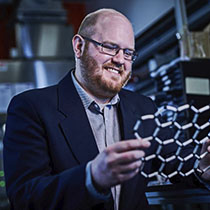
Undergraduate courses
From Materials Science, nanomaterials and polymers to fashion business and technology, a degree from our Department starts your journey.
Undergraduate courses in the Department of Materials are split into two distinct subject areas: fashion business and technology, and materials science and engineering.
Whichever you choose, you'll join the largest and most diverse academic community dedicated to materials in Europe. You'll be taught by leading academics in their field and will have access to unique facilities in our new Home of Engineering and Materials Science.
Materials science and engineering
From the car you drive to the bridge you cross, the clothes you wear to the medicines you may take, materials shape every part of our world. If you want to know what makes some materials strong, others stretchy, and how they can be manipulated and designed to have special, smart, more sustainable and commercially viable properties, then a materials science degree could be for you.

Materials Science and Engineering is where the multidisciplinary fields of physics, chemistry, and biology can come together to solve real world engineering problems.
Dr Mark Bissett / Reader in Nanomaterials
Materials science and engineering involves an understanding of the fundamental behaviour of materials. We aim to improve the performance of existing materials and discover and develop new materials, such as graphene, for novel applications. Materials science is a practical subject at the heart of all major industrial sectors, which combines theory with practical application to meet engineering challenges - from jet engines to nano-robots, artificial tendons to bullet-proof vests, and much more.
Our materials science courses provide a broad coverage of the principles, techniques and applications of materials and, after the first year, offer a wide range of specialist course units, enabling you to focus on areas of particular interest.
Our four year MEng courses give you extensive knowledge of both the fundamentals of materials science and engineering, and expertise in the areas that interest you most. For example, you can develop your understanding of how materials interact with the human body on our biomaterials pathway. Or choose the nanomaterials pathway to concentrate on the applications of advanced materials such as graphene. If you’re interested in exploring the newest developments in advanced alloys and how they’re applied to areas such as environmentally friendly transport, then you can study our MEng with metallurgy specialism.
A key feature of our MEng courses is the six-month research project, this can be carried out in an industry setting, giving you the opportunity to develop your understanding by applying your theoretical and technical knowledge to a substantial research project. Through this project you will gain in-depth experience of using cutting-edge research facilities and develop the interpersonal, communication and presentation skills required by industry.
Our graduates are recognised by employers for their knowledge, advanced research skills and independent thinking and are among the most sought after by employers in a wide range of industrial sectors. There is no telling where a degree in Materials Science from Manchester could take you!
Accrediting organisations
All our undergraduate courses are accredited by the Engineering Council and the Institute of Materials, Minerals and Mining.
Upon graduating with an accredited integrated MEng in engineering, or a BSc (with Honours) plus an accredited Master’s degree, students will have fulfilled the educational requirements for professional registration as a Chartered Engineer (CEng).


The Institute of Materials, Minerals and Mining is aglobal network for the materials cycle, promoting sustainability and greater circularity in the extraction, processing and use of natural resources.


